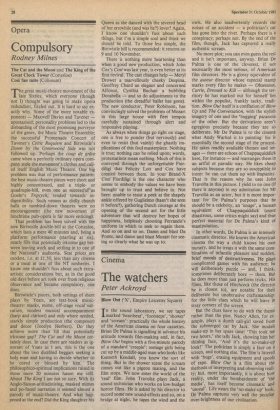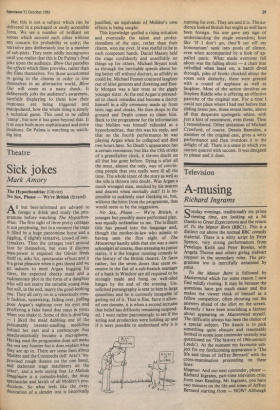Cinema
The watchers
Peter Ackroyd
Blow Out ('X', Empire Leicester Square) In the sound laboratory, we see tapes marked 'heartbeat', 'footsteps', 'shower' and 'scream': practically the whole history of the American cinema on four cassettes. Brian De Palma is signalling in advance his attitude towards film-making and, in fact, Blow Out begins with a five-minute parody of a standard 'creepie': teenage girls being cut up by a middle-aged man who looks like Kenneth Kendall, you know the sort of thing. But in the shower scene the scream comes out like a pigeon mating, and the film stops. We now enter the world of the 'real' film. John Travolta plays Jack, a sound technician who works on low-budget horror films. He is asked by his director to record some new sound-effects and so, on a bridge at night, he tapes the wind and the owls. He also inadvertently records the noises of an accident — a politician's car has gone into the river. Perhaps there is a conspiracy; perhaps not. By the end of the film; though, Jack has captured a really authentic scream.
No more plot; you can even guess the rest and it isn't important, anyway. Brian De Palma is one of the cleverest, if not necessarily the most serious, of American film directors. He is a glossy equivalent of the auteur director whose especial stamp marks every film he makes — Obsession, Carrie, Dressed to Kill — although the territory he has marked out for himself lies within the populist, frankly tacky, tradition. Blow Out itself is a conflation of Blow Up and The Conversation, with the stylish imagery of one and the 'bugging' paranoia of the other. But the derivations aren't egregious precisely because they are so deliberate. Mr De Palma is to the cinema what Andy Warhol is to painting: his is essentially the second stage of the process. He takes readily available themes and images — there are echoes of Chappaquiddick here, for instance — and rearranges them in an artful or parodic way. He likes cheap subjects because they are so susceptible to irony: he can cut them up with impunity. That is the reason why he uses John Travolta in this picture. I yield to no one (if there is anyone) in my admiration for Mr Travolta as an actor, but it is more important for De Palma's purposes that he should be a celebrity, an 'image', a human equivalent of Chappaquiddick (more disastrous, some critics might say) and thus perfect material for De Palma's kind of manipulation.
In other words, De Palma is an intensely cinematic director. He knows the American cinema the way a child knows his own nursery, and he treats it with the same combination of infantile pleasure and sudden, brief moods of destructiveness. He plays complicated games with his audience; he will deliberately puzzle — and, I think, sometimes deliberately bore — them. But he does more than just perform tricks. His films, like those of Hitchcock (the director he is closest to), are notable for their deliberate but unobtrusive craftsmanship: for the little clues which he will leave in stray corners of the screen.
But the clues have to do with the theme rather than the plot. Nancy Allen, for example, plays a dumb call-girl saved front the submerged car by Jack. She models make-up in her spare time: 'This took me two hours,' she tells Jack, showing him her shining face, 'And it's the no-make-up look!' The politician is simply a face on a screen, and nothing else. The film is littered with 'bugs', erasing equipment and spools of tape. Blow Out is a film about the methods of interpreting and observing reality; but, more importantly, it is about how reality, under the bombardment of 'the media', has itself become cinematic and 'unreal'. Life wears the 'no-make-up' look; De Palma captures very well the peculiar over-brightness of our civilisation. But this is not a subject which can be delivered in a packaged or easily accessible form. We see a number of brilliant set scenes which succeed each other without any concern for probability or unity; the narrative gets deliberately lost in a number of sub-plots. They seem oddly incongruous until you realise that this is De Palma's final Joke upon the audience. Blow Out parodies the effects which films provoke, rather than the films themselves. For those accustomed to going to the cinema in order to lose themselves in an alternative world, Blow Out will come as a nasty shock. It deliberately jolts the audience's awareness, carefully displaying to them how their responses are being triggered and manipulated, how the whole thing is simply a technical game. This used to be called 'camp', but now it has gone beyond that. It is at once both more sophisticated and more insidious. De Palma is watching us watching him.







































 Previous page
Previous page